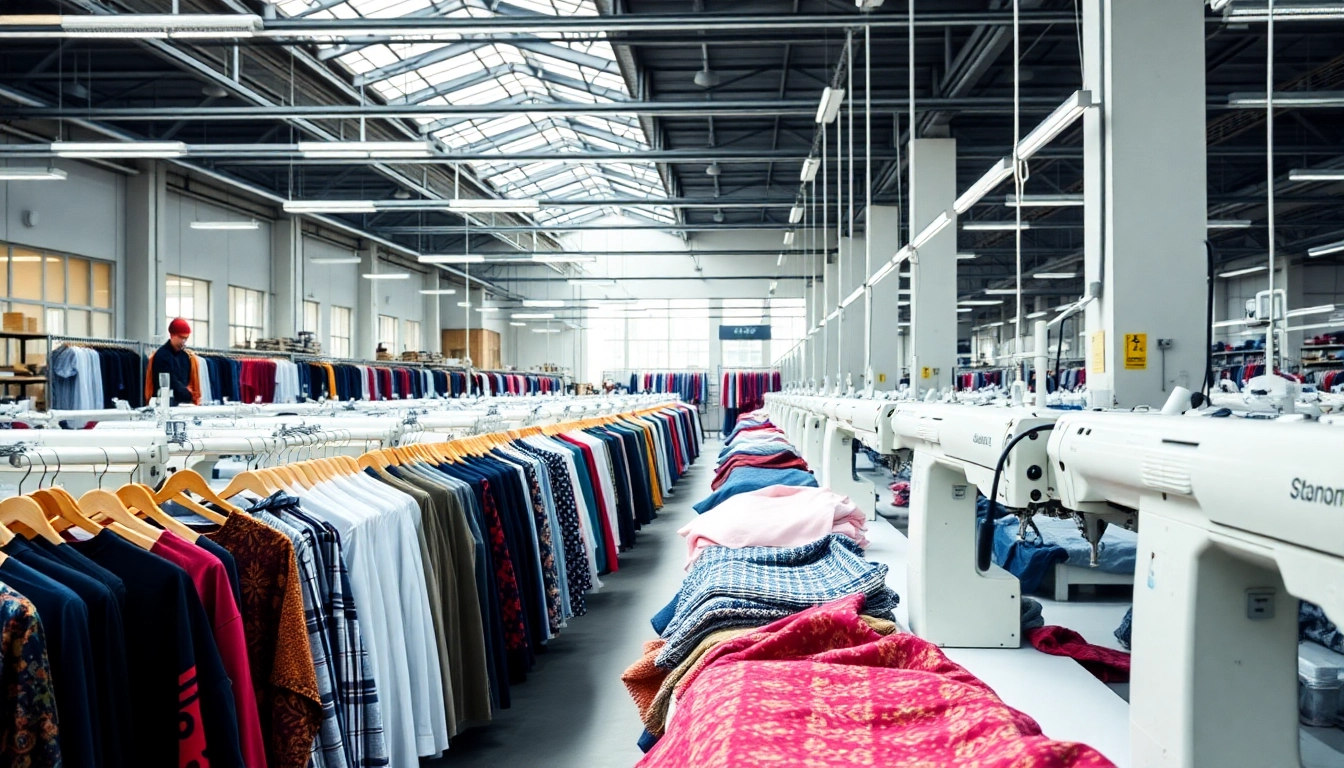Understanding the Role of Clothing Manufacturers in the Fashion Industry
In the fast-paced world of fashion, clothing manufacturers serve as the backbone of the industry, transforming innovative designs into tangible products that reach consumers worldwide. From small brands launching boutique collections to massive international retailers, the partnership with a reliable clothing manufacturer is critical to success. These manufacturers handle everything from fabric sourcing and sample development to mass production and quality assurance. As the demand for customized, sustainable, and high-quality apparel grows, selecting the right manufacturing partner becomes more complex yet more vital than ever. It is essential to grasp the functions, standards, and nuances of clothing manufacturing to build a resilient and scalable supply chain.
For brands looking to establish or expand their presence in the apparel market, understanding the role and services of clothing manufacturers lays a solid foundation. Whether sourcing in Pakistan, China, Bangladesh, or other regions, knowing what to expect and how to choose the best partner can significantly influence product quality, cost-effectiveness, and delivery timelines. To learn more about the industry and find trusted manufacturing partners, visit Clothing Manufacturers for detailed insights and solutions tailored to your needs.
Defining Clothing Manufacturers and Their Services
What Are Clothing Manufacturers?
Clothing manufacturers are companies or entities that produce apparel products based on design specifications, technical patterns, and quality standards provided by brands or designers. They operate factories that handle various stages of clothing creation, including cutting, sewing, finishing, and packaging. These manufacturers may serve the entire process from concept to completed product or focus on specific stages such as embroidery, printing, or material sourcing.
Core Services Offered
- Sample Development: Creating prototypes that match design specifications for approval before mass production.
- Bulk Production: Manufacturing large quantities adhering to specified standards and timelines.
- Quality Control: Inspection at various stages to ensure consistency, durability, and compliance with safety standards.
- Fabric Sourcing & Material Management: Providing high-quality textiles, trims, and accessories tailored to brand requirements.
- Packaging & Labeling: Custom packaging solutions aligned with brand identity.
- Logistics & Shipping: Coordinating delivery to global markets efficiently.
Many manufacturers, particularly those in Pakistan, China, and Bangladesh, offer low minimum order quantities (MOQs) and private label services, enabling emerging brands to test markets with smaller initial runs. Ensuring that these services meet your brand’s quality standards is crucial for building consumer trust and maintaining a competitive edge.
The Importance of Choosing the Right Manufacturing Partner
Partnering with a reputable clothing manufacturer is more than just about production capacity; it’s about aligning values, standards, and operational efficiency with your brand’s vision. The right manufacturer can help you elevate your designs, reduce costs, and shorten lead times, giving you a significant advantage in a crowded marketplace.
Inconsistent quality, delayed shipments, or ethical concerns can damage your brand’s reputation and erode customer trust. Therefore, selecting a manufacturing partner should involve rigorous assessment of their capabilities, certifications, and operational practices.
Additionally, choosing a manufacturer with experience in your niche—be it activewear, luxury fashion, or casual wear—can streamline the development process and ensure better outcomes. Regions like Pakistan have become popular for their skilled labor force and cost-effective production, making them preferred choices for many brands globally.
Key Standards and Certifications for Reliable Clothing Manufacturers
Ensuring your manufacturer adheres to international standards is fundamental to maintaining product quality and compliance. Common certifications include:
- ISO Certifications: Such as ISO 9001 for quality management systems.
- SA8000: Social accountability standards ensuring ethical labor practices.
- OEKO-TEX Standard 100: Certification for textiles tested for harmful substances.
- WRAP Certification: Worldwide Responsible Accredited Production for social compliance.
Manufacturers with these credentials demonstrate their commitment to quality, safety, and ethical sourcing. Verifying these certifications can mitigate risks associated with non-compliance and ensure that your apparel aligns with sustainable and responsible manufacturing practices.
How to Select the Best Clothing Manufacturers for Your Brand
Factors to Consider: Quality, MOQs, Pricing, and Turnaround Time
Choosing the right manufacturer involves evaluating several key aspects:
- Quality Standards: Review samples, ask for references, and verify certifications.
- Minimum Order Quantities (MOQs): Ensure they align with your startup or retail volume goals; many Pakistani manufacturers offer low MOQs starting from 50-100 units.
- Pricing: Obtain detailed quotes and understand cost components—fabric, labor, shipping, and potential tariffs.
- Lead Times: Confirm typical production and shipping durations to plan your launches effectively.
Balancing these factors will help you select a manufacturer capable of scaling with your brand’s growth while maintaining quality and profitability.
Locating Reputable Clothing Manufacturers in Pakistan and Beyond
Pakistan has gained prominence as a top apparel manufacturing hub due to its skilled workforce, competitive labor costs, and quality standards. Leading companies like ZK International and Anis Apparel exemplify reliable partners, offering customized products tailored to global brands. Platforms like Sewport facilitate direct connections between brands and verified Pakistan-based manufacturers, simplifying the sourcing process.
Beyond Pakistan, regions such as China, Bangladesh, and Vietnam are also key players, each offering unique advantages. Conducting thorough due diligence, reviewing certifications, and requesting samples are crucial steps regardless of geographic location.
To streamline your search, consider attending trade shows, leveraging industry directories, and consulting with sourcing agents familiar with local factories and compliance standards.
Building a Long-Term Partnership with Your Clothing Manufacturer
Developing a strong, collaborative relationship with your manufacturing partner can result in significant operational benefits. Long-term partners offer better pricing, priority in production scheduling, and insights into optimizing your supply chain.
Effective communication is essential—clarify expectations, provide detailed technical specifications, and maintain transparency. Regular audits and quality inspections foster trust and ensure consistent delivery of products that meet your standards.
Mutual understanding and strategic alignment transform a transactional supplier relationship into a valuable business partnership that supports brand growth and innovation.
Best Practices for Working with Clothing Manufacturers
Design Communication and Samples Approval
Clear, detailed design mockups and technical sheets minimize misunderstandings. Share specifications, fabric choices, and desired finishes precisely. Approving samples before mass production allows early detection of issues, saving time and costs.
Engage in iterative sample development, maintaining open feedback channels to refine the final product. Digital tools and 3D prototyping can facilitate more accurate communication, especially with remote teams.
Ensuring Quality Control and Production Monitoring
Quality assurance should be integrated into every production phase. Implement in-line inspections, third-party audits, and detailed checklists to monitor adherence to standards. Establish clear quality benchmarks based on initial samples and agreed specifications.
Utilizing technology such as real-time reporting and photographic documentation helps track issues promptly, allowing swift corrective actions and maintaining consistency.
Managing Lead Times and Shipping Logistics
Effective planning and communication are vital to meet market deadlines. Define production schedules, buffer periods, and shipping routes early. Collaborate with freight forwarders experienced in international logistics to optimize costs and transit times.
Stay updated on customs regulations, tariffs, and compliance requirements, especially with growing sustainability and trade compliance mandates. A proactive approach minimizes delays and ensures your products arrive on time to market.
Emerging Trends in Clothing Manufacturing
Sustainable and Eco-Friendly Manufacturing Solutions
The industry is increasingly embracing sustainability, employing eco-friendly fabrics, water-saving dyeing processes, and ethical labor practices. Many manufacturers now hold certifications like OEKO-TEX and GOTS, reinforcing their commitment to environmental and social responsibility. Brands integrating sustainability appeal to conscious consumers and can leverage eco-labels as a marketing advantage.
Examples include using organic cotton, recycled polyester, and innovations like plant-based dyes, which reduce ecological footprints.
Private Label and White Label Apparel Opportunities
Private and white label manufacturing allow brands to launch their own product lines without the complexities of production. This model enhances brand visibility while benefiting from established manufacturing infrastructure. Many factories in Pakistan excel in creating custom private label collections at competitive prices with flexible MOQs, supporting startups and small businesses to scale rapidly.
Leveraging Technology for Better Design and Production Efficiency
Adoption of advanced technology such as CAD (Computer-Aided Design), digital pattern making, and automation streamline design-to-production workflows. These tools reduce errors, accelerate prototypes, and enable rapid iteration, crucial for staying competitive.
Emerging innovations like AI-driven demand forecasting and smart inventory management further enhance manufacturing efficiency, reducing waste and optimizing resource allocation.
Measuring Success and Scaling Your Fashion Business
Key Performance Indicators for Manufacturing Efficiency
Track metrics such as defect rates, lead times, order accuracy, and costs per unit. Monitoring these KPIs helps identify bottlenecks and areas for improvement, ensuring quality and efficiency align with business goals.
Scaling Production Without Compromising Quality
Gradually increase order sizes, maintain stringent quality controls, and foster continuous communication with your manufacturer. Investing in long-term partnerships facilitates smoother scaling, enables better pricing, and ensures consistent standards.
Case Studies of Successful Clothing Brand Collaborations
Many emerging brands have partnered with reputable manufacturers in Pakistan, achieving rapid growth while maintaining high quality. For instance, brands focusing on sustainable activewear successfully leveraged private label manufacturers to expand their product lines without sacrificing their ethical commitments. Analyzing such collaborations reveals best practices in manufacturing, communication, and supply chain management that anyone can adapt.









